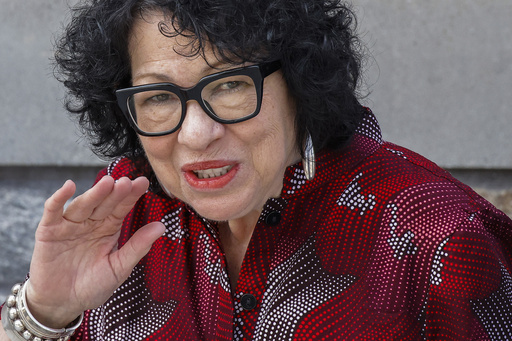
LOUISVILLE, Ky. — During a recent event in Louisville, U.S. Supreme Court Justice Sonia Sotomayor addressed concerns about diminishing public trust in the judicial system, specifically referencing her conservative colleagues’ tendency to overturn long-standing legal precedents.
“I believe my court may gain greater support from the public if it were to exercise greater caution and take more time when reconsidering established precedents,” Sotomayor stated.
Under the influence of the conservative majority, which includes three justices appointed by former President Donald Trump, the Supreme Court has made significant rulings, such as overturning Roe v. Wade, which eliminated nationwide abortion rights safeguards, and dismantled affirmative action policies in higher education that had stood for decades.
While discussing these issues during the event, Sotomayor, who represents the court’s liberal minority, did not specifically reference these landmark cases. However, she expressed that the rapid pace at which the court is moving can create public unease. “When the court implements changes swiftly, it can lead to societal instability and affect how people view legal matters. This can make them question whether decisions are based on legal principles or simply partisan beliefs,” she noted.
She acknowledged that she does not accuse her colleagues of acting with partisan intent; they hold a sincere belief in their interpretation of the Constitution. “In their minds, they are promoting democracy through their perspectives,” she observed. “However, regardless of the truth of their beliefs, the rapid changes can leave people feeling uncertain and unsettled.”
Sotomayor cautioned that excessive and quick changes from the court may provoke public backlash. “If we propel ourselves in ways that the public struggles to comprehend, we jeopardize the court’s integrity,” she explained. “It’s crucial that we adopt a measured approach when reconsidering pre-existing legal frameworks.”
She defended the judiciary as more transparent than other branches of government, emphasizing that judges are required to provide clear explanations for their decisions, ensuring that there are no hidden agendas. “Our rulings come with a written rationale, making our decisions accountable to the law,” she asserted.
When reflecting on her role, Sotomayor expressed the joy she finds in participating actively in consequential decision-making processes. “Being a voice where crucial matters are deliberated is significant to me, even if I do not always emerge victorious,” she remarked, emphasizing the importance of expressing her legal interpretations, which should be voiced regardless of agreement.
Sotomayor also shared the satisfaction she experiences when able to persuade her colleagues on legal discussions, although she acknowledged that such victories have been rare. “Despite the infrequency of these instances lately, they do occur — and that’s what keeps me motivated,” she said.
In a conversation that lasted over an hour, Sotomayor responded to questions from the dean of the University of Louisville law school. She was in town to receive the Brandeis Medal, an honor given to individuals in the legal sector for their contributions to public service and active commitment to social, economic, or political justice. The law school bears the name of Louis D. Brandeis, a former Supreme Court justice hailing from Louisville.
Sotomayor’s nomination to the Supreme Court came from President Barack Obama in 2009.
Earlier at the event, Kentucky’s Democratic Governor Andy Beshear emphasized the Supreme Court’s essential role in upholding an impartial system of law. He stated that justices exemplify the essence of democracy, underscoring that the rule of law is fundamental for a functional government that serves citizens rather than merely the elite.
Beshear, who has previously served as the state’s attorney general and is currently in his second term as governor, has been identified by political analysts as a potential contender for the 2028 presidential race.

